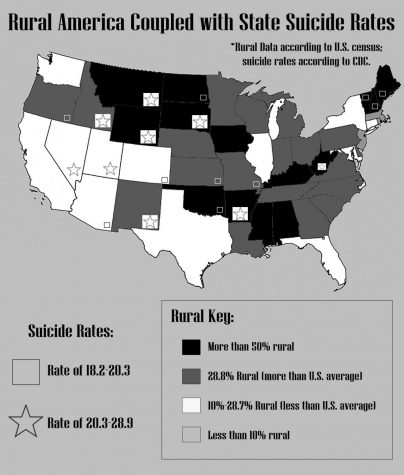Presentation shows mental health importance
November 13, 2019
The Northeast Nebraska Behavioral Health Network gave a presentation in the Frey Conference room in the Student Center on Monday, Nov. 4.
The Co-director of Mountain Plains MHTTC and Vice President of Wester Interstate Commission for Higher Education, Dennis Mohatt, spoke to students about the “wicked problem” that behavioral health is facing.
“There is a future in mental health and there is a need in mental health,” Mohatt said. “One of our biggest challenges is stigma. That well into the 21st century, we still treat mental health as a ‘step-child’ at best that doesn’t really belong in the rest of health care. The distance between where we sit as mental health and where surgeons sit as physicians is a big difference. This all goes back to stigma. Stigma is a nice way to say discrimination, that we treat people with mental illness differently.”
Wayne State College equips Human Service Counseling Service majors with these presentations. The presentation provided students with the knowledge that there are many jobs in the near future in mental health, especially in rural areas. This gives students an opportunity once they graduate.
“Encouraging students at WSC to consider careers as rural mental health professionals is important, as many are from rural communities and are best equipped to return home and be the caring professionals we need,” Mohatt said.
Mohatt said people who live in rural areas are older, sicker and poorer than people who live in urban areas. With the lack of health care providers, both mental and physical, it makes life harder on those living in rural areas. While Nebraska lacks health care, it has more people over the age of 90 than any other state in the United States.
Mohatt said he grew up in the small rural community of Vial, Iowa.
“I saw early in life how hard it was for rural people to get quality healthcare,” Mohatt said. “My father, a volunteer fireman, died in the line of duty. So, service and caring are sort of part of my DNA.”
“I didn’t know what to expect going into the talk,” WSC student Sierra Travis said. “After the talk, I was really impressed with the speaker and his knowledge about mental health in rural areas. I also thought the talk was a good resource to start breaking the stigma around mental health.”








Harold A Maio • Nov 14, 2019 at 2:49 pm
One of our biggest challenges is stigma???
Indeed not, one of the biggest challenges is putting an end to teaching the belief that there is a stigma. May you soon stop accepting the lesson.